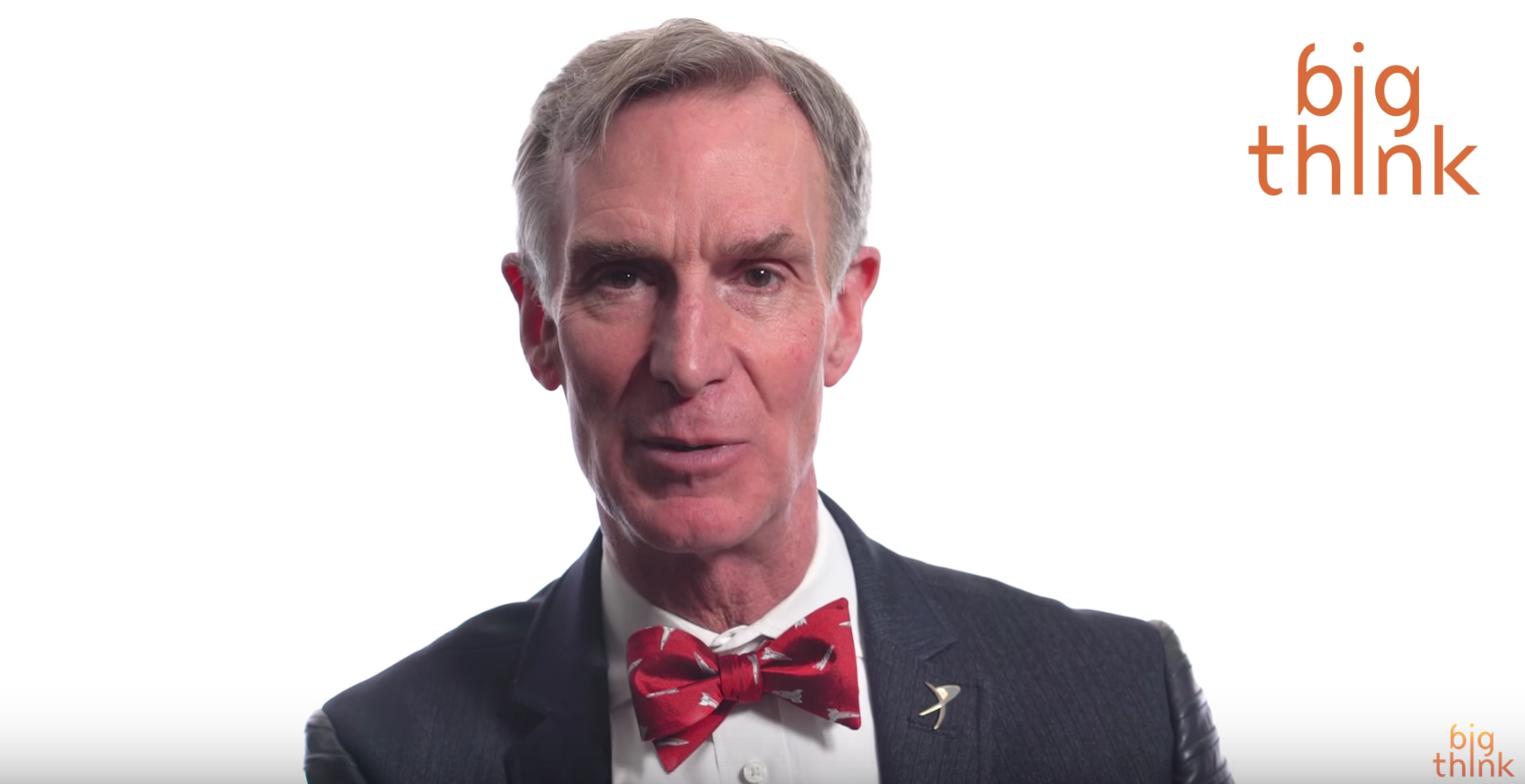 Bill Nye is one of the internet’s most famous scientific atheists—and an after-school ’90s hero. He now has a new series on Netflix and often appears on the Big Think YouTube channel answering questions about science. Every so often a kid will submit a question about the existence of God. While Nye can quickly be dismissive of fundamentalist religion he respectfully acknowledges that many people he knows are deeply religious. Is there a God? He admits he can’t answer that question.
Bill Nye is one of the internet’s most famous scientific atheists—and an after-school ’90s hero. He now has a new series on Netflix and often appears on the Big Think YouTube channel answering questions about science. Every so often a kid will submit a question about the existence of God. While Nye can quickly be dismissive of fundamentalist religion he respectfully acknowledges that many people he knows are deeply religious. Is there a God? He admits he can’t answer that question.
His latest video is titled “Evidence of God Isn’t Necessary to Live a Good Life”. This is true. I know many people who don’t believe in God and live good lives. They’re generous and kind, they desire to help others, and they foster healthy relationships. Countless secular and even explicitly atheist humanitarian organisations exist, and they do great good. But faith is not just about being good or living a good life. Faith is also about transcendence, which resides beyond hard evidence. Non-religious people can feel transcendence in the stars or a sunset, but belief in God gives meaning and purpose that is not only beyond ourselves but has its source in a loving Creator.
 Transcendence for all
Transcendence for all
Does the night sky, which stirs the heart of a non-believer, have it’s source in God? Certainly, though they may not recognise it as such. Jesuit theologian Karl Rahner proposed the idea of the “anonymous Christian”, who “lives in the grace of God and attains salvation outside of explicitly constituted Christianity”. He believed there was a genuine path to salvation—complete union with God—for those who do not acknowledge Jesus Christ as the messiah. The Catechism affirms this, that such a union with the Creator is possible for non-Christians.
So for the Christian, we name the transcendence we tap into as God. The evidence of God is not in hard empirical data, but in the beauty of the trees, the bugs, the ocean, the moonlight, the wildflowers, our children, and all of creation. My faith and belief in God also gives me an explanation for those parts of myself I can’t explain – acts of unconditional love, generosity, gratitude, idle wonder, and other things that are otherwise “unproductive”. Yet for the Christian such actions and dispositions are productive. It is faith that moves me to do good. It is faith that provokes generosity and a spirit of wonder.
The source of our goodness
While non-religious people can feel moved to do good, for me it is a love-response to God. At the beginning of the Second Week of the Spiritual Exercises is the Call of the King meditation. In it, Ignatius presents an image of a great leader with plans to change the world and bring peace and to eradicate poverty. And that leader wants you involved. Then Ignatius changes the scenario where the leader is Christ. How much more would we want to sign on to that mission if it comes from him? The difference is the source of the call. One does not need to be a believer in Christ to want to change the world. But in the second scenario, Christ becomes the very source and reason for that desire. This kind of Christian response is solidified at the end of the Exercises when, after meditating on the endless love of God, we’re invited to make a love-response. For Ignatius, no response other than complete surrender is adequate. Yet for many a Christian, their response to God’s generosity and love is to live a life of generosity and love.
Bill Nye asks a great question: What would you do differently if you knew there was a God or there wasn’t a God? How would it change the way you live your life? For Bill Nye, he wouldn’t do anything differently. He would live a good life, be responsible for his own actions, and leave the world better than he found it. And that’s fine. But he doesn’t explore the source or desire to live that way. Why be responsible or make good choices if they cause you a burden and take away from living a “good life”. What is a “good life” anyway?
We must admit that how we define a good life or a meaningful life is going to be different for each person, believer or not. And, like I said, the evidence of God for a contemplative is all around us. For the non-contemplative scientist the evidence is not to be found. So the question Bill Nye (and the rest of us) should ask is What is the source of life’s goodness and our good actions? For Christians, the answer is in the our name.
Listen to the podcast version of this post…
Audio Player








Excellent! Thank you very much for introducing me to Bill Nye.
so stupid, there is now evidence of god but believing and you know that saying “it isn’t about seeing its about believing” bill nye wants to see to believe he thinks its made up he is trying to push new thoughts about god. he is thinking it’s not true there is no chemical reaction or whatever from believing god you pray and an answer always comes, eventually. bill nye needs to stop pushing to make christians and jews non christians and jews
I have no respect for Bill Nye and his secular beliefs; yet another instance of man thinking he’s far superior to his divine creator. These scientists have a clandestine agenda, which is to peddle false information atop their scaffolds of “science”, which has become a religion in and of itself.
Sure, God existed in both space and time, as the space was Israel and the time was around 4 BC – 30 AD, when Jesus walked the earth, showing himself as Son of God.